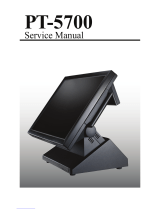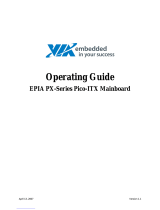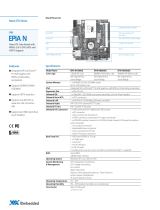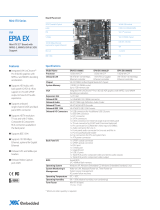Page is loading ...

User’s Manual
EPIA-PX
Version 1.11
August 16, 2007

Copyright
Copyright © 2006-2007 VIA Technologies Incorporated. All rights reserved.
No part of this document may be reproduced, transmitted, transcribed, stored in a retrieval
system, or translated into any language, in any form or by any means, electronic, mechanical,
magnetic, optical, chemical, manual or otherwise without the prior written permission of VIA
Technologies, Incorporated.
Trademarks
All trademarks are the property of their respective holders. PS/2 is a registered trademark of
IBM Corporation. Award BIOS is a registered trademark of Phoenix Technologies Ltd.
Macrovision
Apparatus Claims of U.S. Patent Nos. 4,631,603; 4,819,098; 4,907,093; 5,315,448; 6,516,132
licensed for limited viewing uses only. This product incorporates copyright protection
technology that is protected by certain U.S. patents and other intellectual property rights owned
by Macrovision and other rights owners. Use of this copyright protection technology must be
authorized by Macrovision, and is intended for home and other limited viewing uses only
unless otherwise authorized by Macrovision. Reverse engineering or disassembly is prohibited.
Disclaimer
No license is granted, implied or otherwise, under any patent or patent rights of VIA
Technologies. VIA Technologies makes no warranties, implied or otherwise, in regard to this
document and to the products described in this document. The information provided in this
document is believed to be accurate and reliable as of the publication date of this document.
However, VIA Technologies assumes no responsibility for the use or misuse of the information
in this document and for any patent infringements that may arise from the use of this document.
The information and product specifications within this document are subject to change at any
time, without notice and without obligation to notify any person of such change.

FCC-B Radio Frequency Interference Statement
This equipment has been tested and found to comply with the limits for a class B digital device,
pursuant to part 15 of the FCC rules. These limits are designed to provide reasonable
protection against harmful interference when the equipment is operated in a commercial
environment. This equipment generates, uses and can radiate radio frequency energy and, if not
installed and used in accordance with the instruction manual, may cause harmful interference
to radio communications. Operation of this equipment in a residential area is likely to cause
harmful interference, in which case the user will be required to correct the interference at his
personal expense.
Notice 1
The changes or modifications not expressly approved by the party responsible for compliance
could void the user's authority to operate the equipment.
Notice 2
Shielded interface cables and A.C. power cord, if any, must be used in order to comply with
the emission limits.
Tested To Comply
With FCC Standards
FOR HOME OR OFFICE USE

Safety Instructions
1. Always read the safety instructions carefully.
2. Keep this User's Manual for future reference.
3. Keep this equipment away from humidity.
4. Lay this equipment on a reliable flat surface before setting it up.
5. The openings on the enclosure are for air convection hence protects the equipment from
overheating. DO NOT COVER THE OPENINGS.
6. Make sure the voltage of the power source and adjust properly 110/220V before
connecting the equipment to the power inlet.
7. Place the power cord in such a way that people cannot step on it. Do not place anything
over the power cord.
8. Always unplug the power cord before inserting any add-on card or module.
9. All cautions and warnings on the equipment should be noted.
10. Never pour any liquid into the opening. Liquid can cause damage or electrical shock.
11. If any of the following situations arises, get the equipment checked by a service personnel:
• The power cord or plug is damaged
• Liquid has penetrated into the equipment
• The equipment has been exposed to moisture
• The equipment has not work well or you cannot get it work according to User's
Manual.
• The equipment has dropped and damaged
• If the equipment has obvious sign of breakage
12. DO NOT LEAVE THIS EQUIPMENT IN AN ENVIRONMENT UNCONDITIONED,
OR STORAGE TEMPERATURE ABOVE 60
o
C (140
o
F), THE EQUIPMENT MAY BE
DAMAGED.
CAUTION: Explosion or serious damage may occur if the battery is
incorrectly replaced. Replace only with the same or equivalent
battery type recommended by the manufacturer.

i
BOX CONTENTS
One EPIA PX Pico-ITX Mainboard
One ATA-133/100/66 IDE Ribbon Cable
One PS/2 Ribbon Cable
One Power Ribbon Cable
One COM Port Ribbon Cable
One DVI Ribbon Cable
One Driver Utility CD
Two Screws (for the COM port)

ii
TABLE OF CONTENTS
SPECIFICATIONS ............................................................................1
MAINBOARD SPECIFICATIONS.............................................................2
MAINBOARD LAYOUT ........................................................................4
BACK PANEL LAYOUT .......................................................................4
INSTALLATION ...............................................................................5
CPU ................................................................................................6
CPU Fan: CPU_FAN ...................................................................6
MEMORY MODULE INSTALLATION ......................................................7
Memory Slot: DDR2_SODIMM ......................................................7
Available DDR2 SDRAM Configurations........................................7
CONNECTING THE POWER SUPPLY ......................................................8
Pico-ITX 12-Pin Power Connector.................................................8
BACK PANEL PORTS ..........................................................................9
VGA Port......................................................................................9
RJ45 LAN Port..............................................................................9
CONNECTORS..................................................................................10
IDE Connector: IDE ..................................................................10
Serial ATA Connectors: SATA.....................................................11
USB Pin Connector: USB ...........................................................11
KBMS Connector: PS/2 ..............................................................11
Case Connector: Front Panel .....................................................12
Power Switch (PW_BN)...............................................................12
Reset Switch (RST_SW) ...............................................................12
Power LED (PWR_LED)..............................................................12
HDD LED (HD_LED)..................................................................12
Speaker (SPEAK)........................................................................12
Audio Connector: AUDIO...........................................................13
Serial Port Connector: COM Port...............................................13
LVDS/DVI Panel Connector: LVDS Panel ...................................14
Multimedia Connector.................................................................16
JUMPERS ........................................................................................17
Clear CMOS: CMOS Reset ..........................................................17

iii
BIOS SETUP....................................................................................19
ENTERING SETUP ............................................................................20
CONTROL KEYS ..............................................................................21
NAVIGATING THE BIOS MENUS........................................................22
GETTING HELP................................................................................23
MAIN MENU ...................................................................................24
Standard CMOS Features............................................................24
Advanced BIOS Features.............................................................24
Advanced Chipset Features..........................................................24
Integrated Peripherals ................................................................24
Power Management Setup............................................................24
PnP/PCI Configurations..............................................................24
Frequency/Voltage Control..........................................................24
Load Fail-Safe Defaults ..............................................................25
Load Optimized Defaults.............................................................25
Set Supervisor Password .............................................................25
Set User Password ......................................................................25
Save & Exit Setup .......................................................................25
Exit Without Saving.....................................................................25
STANDARD CMOS FEATURES...........................................................26
Date...........................................................................................26
Time...........................................................................................26
Halt On ......................................................................................26
Video..........................................................................................26
IDE DRIVES....................................................................................27
ADVANCED BIOS FEATURES ............................................................28
Virus Warning ............................................................................28
Quick Power On Self-Test............................................................28
First/Second/Third Boot Device...................................................29
Boot Other Device.......................................................................29
Boot Up NumLock Status.............................................................29
Typematic Rate Setting................................................................29
Security Option...........................................................................30
MPS Variation Control for OS.....................................................30
OS Select For DRAM > 64MB......................................................30

iv
Full Screen Logo Show................................................................30
CPU FEATURE ................................................................................31
Deplay Prior to Thermal .............................................................31
Thermal Management..................................................................31
TM2 Bus Ratio............................................................................31
TM2 Bus VID..............................................................................32
C7 CMPXCHGB..........................................................................32
C7 NoExecute (NX).....................................................................32
HARD DISK BOOT PRIORITY.............................................................33
ADVANCED CHIPSET FEATURES........................................................34
Memory Hole..............................................................................34
System BIOS Cacheable...............................................................34
Video RAM Cacheable.................................................................34
Init Display First ........................................................................34
Select Display Device..................................................................35
Panel Type..................................................................................35
AGP & P2P BRIDGE CONTROL .........................................................36
AGP Aperture Size ......................................................................36
AGP 2.0 Mode ............................................................................36
AGP Driving Control ..................................................................37
AGP Fast Write...........................................................................37
AGP Master 1 WS Write ..............................................................37
AGP Master 1 WS Read...............................................................37
AGP 3.0 Calibration Cycle..........................................................37
VGA Share Memory Size..............................................................37
Direct Frame Buffer....................................................................37
CPU & PCI BUS CONTROL...............................................................38
PCI Master 0 WS Write ...............................................................38
PCI Delay Transaction................................................................38
DRDY_Timing.............................................................................38
INTEGRATED PERIPHERALS ..............................................................39
Onboard Serial Port....................................................................39
VIA ONCHIP PCI DEVICE ................................................................40
Azalia HAD Controller................................................................40
LAN Boot ROM...........................................................................40

v
USB DEVICE SETTING .....................................................................41
USB 1.0 Controller .....................................................................41
USB 2.0 Controller .....................................................................41
USB Operation Mode ..................................................................41
USB Keyboard Function..............................................................42
USB Storage Function.................................................................42
No Device...................................................................................42
POWER MANAGEMENT SETUP...........................................................43
ACPI Suspend Type.....................................................................43
Power Management Option..........................................................43
HDD Power Down.......................................................................43
Suspend Mode.............................................................................43
Video Off Option.........................................................................44
Video Off Method........................................................................44
MODEM Use IRQ .......................................................................44
Soft-Off by PWRBTN...................................................................44
Run VGABIOS if S3 Resume.........................................................44
AC Loss Auto restart...................................................................44
WAKEUP EVENT DETECT .................................................................45
PS2KB Wakeup Select .................................................................45
PS2KB Wakeup Key Select...........................................................45
PS2MS Wakeup Key Select...........................................................45
PS2 Keyboard Power On .............................................................46
PS2 Mouse Power On..................................................................46
PowerOn by PCI Card.................................................................46
Modem Ring Resume ...................................................................46
RTC Alarm Resume .....................................................................46
Date (of Month) ..........................................................................46
Resume Time (hh:mm:ss).............................................................46
PNP/PCI CONFIGURATIONS .............................................................47
PNP OS Installed........................................................................47
Reset Configuration Data............................................................47
Resource Controlled By...............................................................48
PCI/VGA Palette Snoop...............................................................48
Assign IRQ For VGA/USB ...........................................................48

vi
Maximum ASPM supported..........................................................48
Maximum Payload Size................................................................48
FREQUENCY / VOLTAGE CONTROL ....................................................49
DRAM Clock...............................................................................49
Auto Detect PCI Clk....................................................................49
DRAM CLOCK/DRIVE CONTROL.......................................................50
DRAM Clock...............................................................................50
DRAM Timing.............................................................................50
Read to Precharge (Trtp) ............................................................51
Write to Read CMD (Trtp)...........................................................51
Write Recovery Time (Twr)..........................................................51
DRAM Command Rate.................................................................51
RDSAIT mode .............................................................................51
LOAD FAIL-SAFE DEFAULTS ............................................................52
LOAD OPTIMIZED DEFAULTS............................................................53
SET SUPERVISOR / USER PASSWORD .................................................54
SAVE & EXIT SETUP ........................................................................56
EXIT WITHOUT SAVING ...................................................................57
DRIVER INSTALLATION ..............................................................59
DRIVER UTILITIES...........................................................................60
Getting Started ...........................................................................60
Running the Driver Utilities CD ..................................................61
CD CONTENT..................................................................................62

vii
This page is intentionally left blank.


1
C
HAPTER
1
Specifications
The ultra-compact and highly integrated VIA EPIA-PX Pico-ITX
mainboard is the smallest form-factor available today. Through a
high level of integration, the Pico-ITX measures at only 25% of
the size of a Mini-ITX mainboard. The mainboard enables the
creation of an exciting new generation of small, ergonomic,
innovative and affordable embedded systems.

Chapter 1
2
MAINBOARD SPECIFICATIONS
CPU
• Supports VIA C7 1.0GHz NanoBGA2 Processor
Chipset
• VIA VX700 Advanced All-in-One System Processor
Memory
• 1 x DDR2 533 SODIMM slot (up to 1 GB)
Graphics
• Integrated UniChrome™ Pro II 3D/2D AGP with MPEG-2/4 and
WMV9 Video Decoding Acceleration
IDE
• 1 x UltraDMA 133/100 connector (2.0mm 40-pin connector)
Serial ATA
• 1 x SATA connector
LAN
• VIA VT6106S 10/100 Mbps Fast Ethernet Controller with Power
Management Functions
Audio
• VIA VT1708A High Definition Audio Codec
Back Panel I/O Port
• 1 x RJ-45 LAN Port
• 1 x VGA Port

Specifications
3
Onboard I/O Connectors
• 1 x USB pin connector for 4 additional USB 2.0 ports
• 1 x COM pin connector
• 1 PS2 mouse/keyboard pin connector
• 1 Fan pin connector for CPU Fan
• 1 x LVDS/DVI panel pin connector
• 1 Audio pin connector for Line-out, Line-in, MIC-in, S/PDIF in,
and 7.1 Channels Audio Output
• 1 Multimedia connector to support External TV-Out Interface,
Video Capture Port Interface and Low Pin Count Interface.
(One VT1625M add-on card is required.)
• 1 x Pico-ITX power connector
BIOS
• Award BIOS with LPC 4/8Mbit flash memory capacity
Form Factor
• Pico-ITX (10 layers)
• 10 cm X 7.2 cm

Chapter 1
4
MAINBOARD LAYOUT
BACK PANEL LAYOUT

5
C
HAPTER
2
Installation
This chapter provides you with information about hardware
installation procedures. It is recommended to use a grounded wrist
strap before handling computer components. Electrostatic discharge
(ESD) can damage some components.

Chapter 2
6
CPU
The VIA EPIA-PX Pico-ITX mainboard can support VIA C7 NanoBGA2
processor. The processor requires a heatsink with fan for 1.0GHz SKU.
CPU Fan: CPU_FAN
The CPU_FAN runs on +5V and maintain CPU cooling. When connecting the
wire to the connectors, always be aware that the red wire (positive wire)
should be connected to +5V. The black wire is Ground and should always be
connected to GND.
Pin Signal
1 FAN OUT
2 +5V
3 GND
1

Installation
7
MEMORY MODULE INSTALLATION
Memory Slot: DDR2_SODIMM
The VIA EPIA-PX Pico-ITX mainboard provides one SODIMM slot for DDR2
533 SDRAM memory modules and supports memory sizes up to 1GB.
Insert the SODIMM module at a 45 degree angle.
Push the SODIMM module back towards the board until the clips lock the
module in place.
Available DDR2 SDRAM Configurations
Refer to the table below for available DDR2 SDRAM configurations on the
mainboard.
Slot Module Size Total
SODIMM 64MB, 128MB, 256MB, 512MB, 1GB 64MB-1GB
Maximum supported system memory 64MB-1GB

Chapter 2
8
CONNECTING THE POWER SUPPLY
The VIA EPIA-PX Pico-ITX mainboard supports a Pico-ITX power supply for
the power system. Before inserting the power supply connector, always
make sure that all components are installed correctly to ensure that no
damage will be caused.
Pico-ITX 12-Pin Power Connector
To connect the power supply, make sure the power plug is inserted in the
proper orientation and the pins are aligned. Then push down the plug firmly
into the connector.
Pin Signal
1 +3.3V
2 +5V_SB
3 +12V
4 +5V
5 +5V
6 PWRGD
7 +3.3V
8 +3.3V
9 GND
10 PWRON
11 GND
12 GND
/



